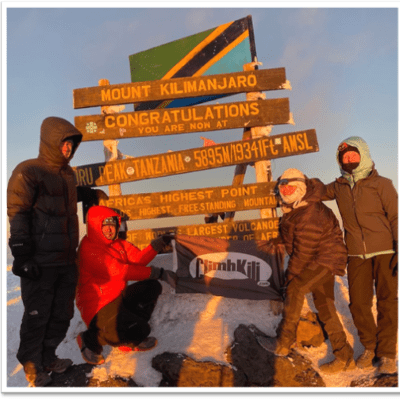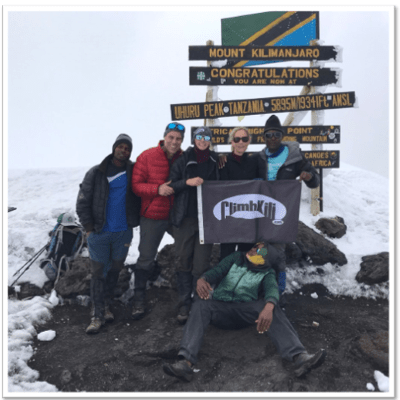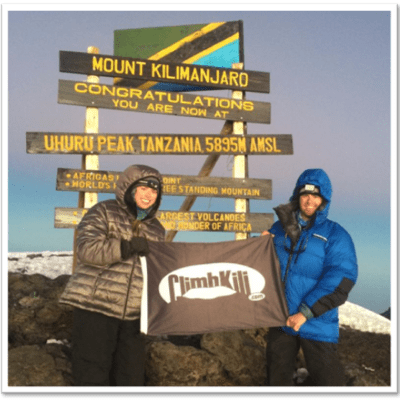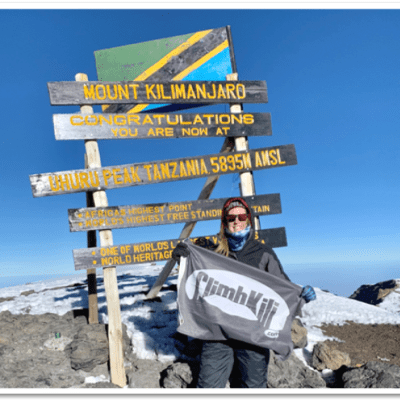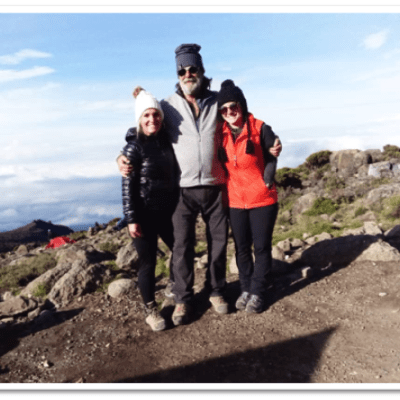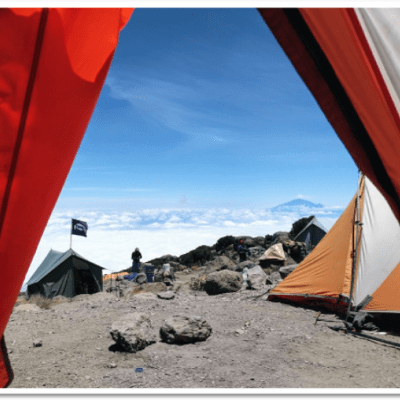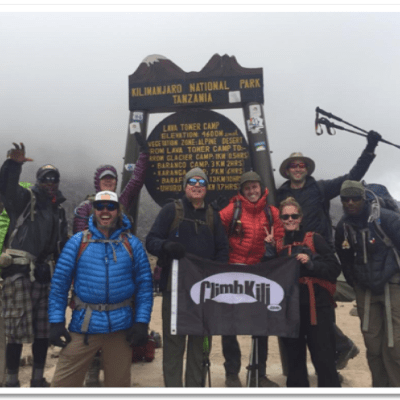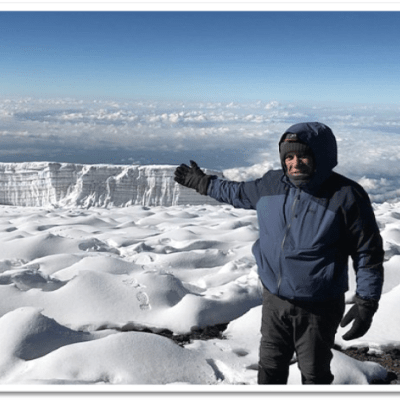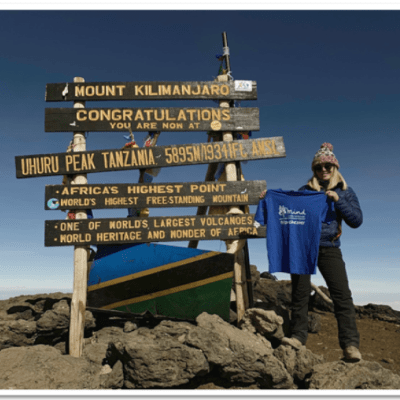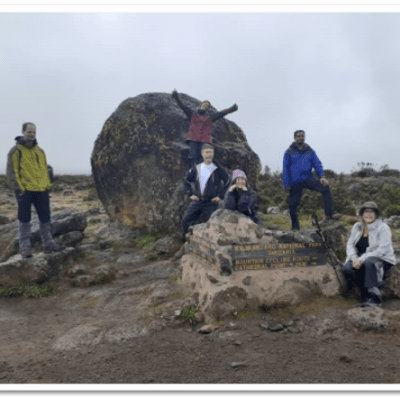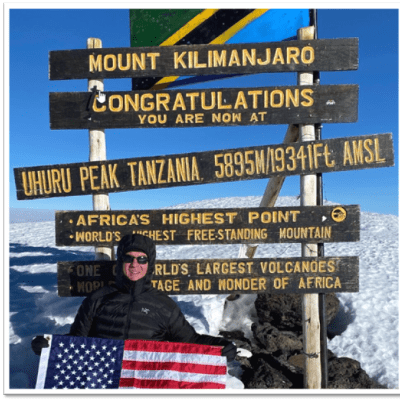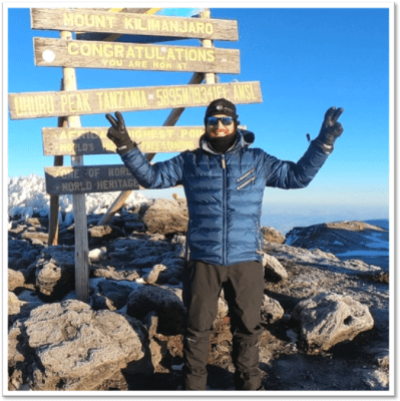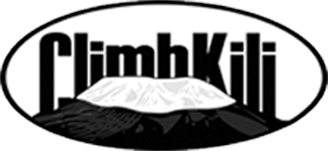Frequently
Asked Questions
Most recommended Company on TripAdvisor!
Longest Reviewed, Highest Reviewed, Most Reviewed Company on Kili
FAQs
Many questions will arise throughout your Kilimanjaro climb and safari planning
Our staff will address and provide all anwsers needed, Here are a few helpful answers to common questions
Kilimanjaro has been summited every day of the year. We have scheduled climbs every week, year round. If you have a particular event or day you would like to be standing on the summit, we will arrange that. The following provides detail on average monthly temperatures (at the beginning of the climb, not on the upper mountain) and rainfall:
MonthJanuary February March April May June July August September October November December |
Avg. Temp. (F ~ C)78° ~ 26° 78° ~ 26° 78° ~ 26° 76° ~ 24° 72° ~ 22° 70° ~ 21° 69° ~ 21° 70° ~ 21° 71° ~ 22° 75° ~ 24° 76° ~ 24° 77° ~ 25° |
Rainfall (inches ~ cm)1.4 ~ 3.6 2.0 ~ 5.1 4.7 ~ 11.9 13.8 ~ 35.1 9.3 ~ 23.6 1.5 ~ 3.8 1.0 ~ 2.5 .7 ~ 1.8 .6 ~ 1.5 1.0 ~ 2.5 2.5 ~ 6.4 2.1 ~ 5.3 |
Climb Kili selects routes that are the most scenic, best for acclimatization and yield the greatest chance of success. Please view our 3D Routes for further detail.
You can overpay to climb Kili and you can under pay.
Cheap operators may sacrifice:
- Safety equipment
- Contract out your climb to unknown companies
- Non-certified guides with no medical training
- Neglect proper cooking preparations
- Exclude private sanitary facilities
- Poor group equipment
- Select quick and crowded routes
- the list can go on and on….
Overpriced operators pay a hefty premium for top internet ad space, include unnecessary days on and off the mountain, mail costly promotional material, or simply charge thousands more to illicit an increased sense of security and/or comfort.
Compare Climb Kili to ANY overpriced operator and we Guarantee to offer more services, safety and summit success, all at a better value.
Our clients safety has been and always will be our number one priority. In addition to the Center for Disease Control guidelines, we at Climb Kili have the following:
- Hand sanitizer in all transportation vehicles. From the first airport pick up to the last drop off
- Masks on mountain crews
- Masks and gloves for all chefs and mountain kitchen staff
- Personal hot water basin for client face/hand washing at tent morning and evening
- Proper staff distancing during trekking
Depending upon the selected route, you may trek an average of 4-8 hours per day with the summit day being the longest. Our 3D interactive map shows details on how far you trek and the elevation change each day.
Climb Kili provides a detailed Equipment List in the Welcome Package that ensures every detail and item is in order.
Yes. With our ON-SITE Rental Shop at the hotel, Climb Kili rents anything from sleeping bags to warm jackets down to trekking poles and gaiters. If you currently don’t have items on the Equipment List and feel it would be better to rent, simply reserve these items and we’ll have them ready for you upon arrival.
No other company provides more safety equipment than Climb Kili. From supplemental oxygen, to altitude bags, portable stretchers to pulse oximeters, you are in good hands should the rare occasion arise that these safety devises are needed. Each Lead guide is certified for the usage and handling of all our safety equipment.
While there are no current restrictions for non Africans entering Tanzania, you should however check with your local travel clinic for the latest recommendations. We highly recommend you are up to date with your Hepatitis A & B, Typhoid, and Tetanus.
For current Health information for Travels to Tanzania, visit the Center for Disease Control website.
The majority of those climbing Kilimanjaro and/or traveling on safari fly into Kilimanjaro International Airport (Airport Code: JRO). Some find it more economical flying to Nairobi, Kenya (Airport Code: NBO) and then taking the 6-8 hour shuttle transportation to Arusha or Moshi.
Whether you fly into Tanzania or arrive by shuttle bus, our Climb Kili staff will be there at the airport or bus station to greet you and your adventure will being!
Additional Airport codes of interest: Zanzibar (ZNZ), Arusha (ARK), Dar es Salaam (DAR), Serengeti Airstrip/Airport (SEU)
Our hotels have a Safe Room that stores all baggage and equipment not needed for the climb or safari.
Climb Kili provides a detailed Fitness Program based on your time before departure, the altitude you live, age, and fitness level. Climb Kili offers a comprehensive personal fitness program to ensure your condition prior to taking your first step on the mountain.
The majority of our clients have not been at high altitude before and do not know how their body will react. Diamox (generic name Acetazolamide) is a carbonic anhydrase inhibitor, which means it forces the kidneys to expel bicarbonate, thus re-acidifying the blood. The drug forces the kidneys to emit bicarbonate. By increasing the amount of bicarbonate removed to the urine, the blood becomes more acidic. Acidifying the blood stimulates ventilation, which increases the amount of oxygen in the blood and has shown to decrease the detrimental effects of altitude on the body.
This is a personal choice and has been known to assist clients with minimizing the effects of altitude.
This should ultimately be a decision between you and your physician.
Tanzania’s official languages are English and Swahili.
All Climb Kili guides speak English, with some of our guides conversant in French, German, Italian, and Spanish.
We want you to bring home Kilimanjaro and Safari memories, but no matter how hard you try, there are some things you just can’t plan for. You are welcome to choose the best company policy for you. Many of our adventures have found AIG Travel Guard as a perfect policy as it includes high altitude trekking (Kilimanjaro) and AIG Travel Guard was Ranked #1 travel insurance by Forbes.
AIG Travel Guard Includes just some of the following:
- Baggage Delay and Protection
- Trip Cancelation, Delay, Interruption
- Emergency Evacuation, Travel Assistance
- Medical Assistance and Expense
- And much more
The Visa to enter Tanzania is USD$100 for US citizens and $50 for all others. These can be purchased upon arrival at Tanzania Airports or at the Kenya/Tanzania boarder or online prior to arrival at www.immigration.go.tz US Cash or Tanzanian Shilling ONLY. Ensure your passport is valid at least 6 months from the entry date into Tanzania.
The Tanzanian Shilling is the national currency. US Dollars are widely accepted throughout Moshi and Arusha and park entrances throughout the Safari. There are also many currency exchange locations and banks to facilitate currency trade throughout Moshi and Arusha.
Credit cards are only accepted at the airlines and major hotels within Tanzania. Plan on traveling with sufficient US Dollars.
We understand that sufficient caloric intake and purified water are essential to keep the body functioning properly high up on the mountain. Our menu is specific to the activities of that day, and day of trekking ahead. By incorporating the right balance of carbohydrates and proteins, we keep our clients in top health.
We have vegetarian & vegan menus available and accommodate gluten free and do our best with other special dietary situations.
The following are a sample of our menu items:
Breakfast
- Tea, Coffee, Hot Chocolate
- Toast, Biscuits with Margarine, Jam, Peanut Butter
- Eggs, meat, sausage
- Porridge
- Fresh fruits: Mango, Banana, Avocado, Watermelon, Oranges
- Tea, Coffee, Hot Chocolate
- Chicken or Vegetable Soup
- Bread, Biscuits or Pancakes with Jam, Peanut Butter
- Sandwich with Meat or Cheese, Boiled Egg
- Snack: Peanuts, Popcorn, Cake, Cookies
- Fresh fruits and Fruit Salad: Tomato, Cucumber, Onion, Carrots
- Tea, Coffee, Hot Chocolate
- Chicken or Vegetable Soup
- Bread, Biscuits or Pancakes with Jam, Peanut Butter
- Roasted Chicken, Beef or Fish
- Potatoes, Rice, Pasta
- Fresh Vegetables: Carrots, Peas, Tomato, Beans
Welcome Packet: including Detailed Itinerary, Invoice, Information Guide, Equipment List, Personalized Fitness Training program, Kilimanjaro Journal, warm Summit Cap.
- Personal trekking coordinator to assist throughout your preparation
- Transport to and from Kilimanjaro Airport
- Private Toilet Included
- 2 Nights Hotel
- Breakfast at Hotel
- Daily trip reports our office staff emails back home to interested friends and family
- Transportation to and from your selected route
- All personal and group tents
- All Tanzanian National Park Fees
- Government Climbing Taxes
- Climbing permits
- All Meals while on Kilimanjaro and Safari
- Sleeping pads
- Private chemical toilets
- Staff Salaries
- All meals during the duration
- Purified water
- Climb Kili exclusive Guides, Assistant Guides, Chefs and Porters
- Safety Equipment:
- Emergency Oxygen
- Hyperbaric Bag
- Pulse Oximeter
- Hot drinks at every meal
- One tree planted on your behalf
- Free wireless internet at the hotel
- Solo Supplement included (if applicable)
- Personal Summit Certificate signed by the National Park
- Climb Kili’s exclusive Guarantee
On Kilimanjaro and Safari tipping is an expected practice for the crew who assist you.
As a general rule USD$250 to USD$300 per person will adequately cover crew tips on the mountain.
For Safari, USD$15 per person per day is recommended.
Several factors can increase or decrease the per person amounts such as longer expedition will increase the overall amount as well as smaller groups typically will tip more as they will employ a larger number of crew per customer ratio than larger groups. The tip can be given to the Lead Guide the final night or the following day at the end gate. Your Lead Guide will appropriately distribute to your mountain crew.
You can confirm your booking via our secure Online Reservation form. We’ll send out your Welcome Package soon and you’ll be on your way!
FAQs
Safari Questions
We can customize your safari to accommodate your schedule. Our Safari’s typically range from 3-7 days.
All our vehicles are Land Rover and Land Cruisers which are serviced after each and every safari. All our vehicles have pop up canopy roofs with personal window seat viewing for each client.
